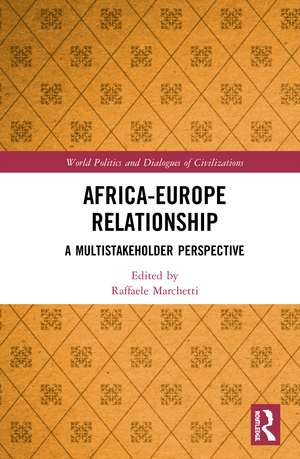Africa-Europe Relationships: A Multistakeholder Perspective: World Politics and Dialogues of Civilizations
Editat de Raffaele Marchettien Limba Engleză Hardback – 7 iul 2020
Going beyond pure intergovernmentalism, this focus of this book is on activists, business people, religious believers, local politicians as well as transnational networks and by hybrid coalitions. Such plurality of socio-economic and political interactions underpinning the relationship between Africa and Europe is underexamined and yet of great importance. The text identifies new patterns of cooperation and recurrent obstacles in the African-European multistakeholder dynamics, thus opening the way for a more accurate understanding of the future relationship between Africa and Europe.
This book brings African and European reflections together, on an equal standing, in order to achieve a true dialogue among civilizations. This book is aimed at all those who are interested in African-European relationships, including students and researchers, as well as activists, business people, civil servant and functionaries at local and national level.
| Toate formatele și edițiile | Preț | Express |
|---|---|---|
| Paperback (1) | 317.33 lei 6-8 săpt. | |
| Taylor & Francis – 29 apr 2022 | 317.33 lei 6-8 săpt. | |
| Hardback (1) | 837.25 lei 6-8 săpt. | |
| Taylor & Francis – 7 iul 2020 | 837.25 lei 6-8 săpt. |
Preț: 837.25 lei
Preț vechi: 1021.03 lei
-18% Nou
Puncte Express: 1256
Preț estimativ în valută:
160.20€ • 167.72$ • 132.56£
160.20€ • 167.72$ • 132.56£
Carte tipărită la comandă
Livrare economică 05-19 aprilie
Preluare comenzi: 021 569.72.76
Specificații
ISBN-13: 9780367467197
ISBN-10: 0367467194
Pagini: 200
Ilustrații: 2
Dimensiuni: 156 x 234 x 13 mm
Greutate: 0.46 kg
Ediția:1
Editura: Taylor & Francis
Colecția Routledge
Seria World Politics and Dialogues of Civilizations
Locul publicării:Oxford, United Kingdom
ISBN-10: 0367467194
Pagini: 200
Ilustrații: 2
Dimensiuni: 156 x 234 x 13 mm
Greutate: 0.46 kg
Ediția:1
Editura: Taylor & Francis
Colecția Routledge
Seria World Politics and Dialogues of Civilizations
Locul publicării:Oxford, United Kingdom
Public țintă
Postgraduate, Professional, and Undergraduate AdvancedCuprins
Introduction 1. A more encompassing understanding of the Africa-European relationship Civil society organizations 2. European-South African elite collaboration, balanced by civil society solidarity 3. Mission, Development and ‘Reverse Mission’ in Europe-Africa Religious Relations 4. The Role of Think Tanks between Africa and the EU 5. The Exacerbation of Community Confinement: Involved Social Forces and Effects on the Euro-African State Relationship Business organizations 6. Bi-continental Encounters for Fairer ACP-EU trade? Assessing Multi-Stakeholder Initiatives 7. Sleeping Beauty Awakens. Africa rise and the new deal with international energy stakeholders 8. The evolution (2000-2017) and proposed future scenarios of EU Africa Relations in Technological innovation: A multi-stakeholder perspective Institutions 9. Eurafrica reconsidered: Europe and African leaders in historical perspectives 10. Integration Dynamics between the African Union (AU) and the Regional Economic Communities (RECs) in light of a newly oriented Euro-African Geopolitics 11.Entangled regions: how multiple interregionalisms reshape Central Africa 12. Cities in the Africa-Europe Interaction
Notă biografică
Raffaele Marchetti is Deputy Rector for Internationalization and Associate Professor in International Relations at the Department of Political Science and the School of Government of LUISS, Italy. His research interest concerns global politics and governance, hybrid and city diplomacy, transnational civil society, (cyber-)security and political risk, and democracy. His most recent publications include Government–NGO Relationships in Africa, Asia, Europe and MENA (Routledge, 2018) and Debating Migration to Europe: Welfare vs Identity (Routledge, 2017).
Descriere
The relationship between Africa and Europe is of high strategic importance. This volume studies the ongoing dynamics between the two continents by adopting a pluralist understanding of international relations which encompasses non-state actors as well as states.




